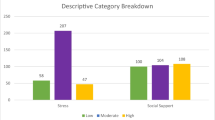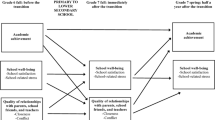Abstract
Lesbian, gay, bisexual, queer, and youth with other minority sexual orientations (LGBQ+) who are more out to others about their sexual orientation identity may experience greater victimization at school based on sexual orientation, gender identity or expression, with negative implications for academic performance. Teacher support, however, may buffer these associations. Among a national US sample of cisgender and trans/non-binary LGBQ+ youth (n = 11,268; 66.1% White, 66.8% cisgender, Mage = 15.5 years, SDage = 1.3), latent moderated-mediation models were tested in which perceived teacher support and affirmation moderated the extent to which sexual orientation identity outness was associated with poorer reported academic performance in part through its association with greater victimization. As hypothesized, greater perceived teacher support and affirmation buffered (a) the association between sexual orientation identity outness and victimization, (b) the association between victimization and reported academic performance, and (c) the indirect association between sexual orientation identity outness and reported academic performance through victimization. These findings underscore the important protective role of supportive teachers for LGBQ+ youth in schools.





Similar content being viewed by others
References
Aragon, S. R., Poteat, V. P., Espelage, D. L., & Koenig, B. W. (2014). The influence of peer victimization on educational outcomes for LGBTQ and non-LGBTQ high school students. Journal of LGBT Youth, 11, 1–19.
Berger, C., Poteat, V. P., & Dantas, J. (2019). Should I report? The role of general and sexual orientation-specific bullying policies and teacher behavior on adolescents’ reporting of victimization experiences. Journal of School Violence, 18, 107–120.
Bronfenbrenner, U., & Morris, P. A. (2006). The bioecological model of human development. In R. M. Lerner (Ed.), Handbook of child psychology, vol. 1: Theoretical models of human development. 6th ed. (pp. 793–828). Hoboken, NJ: Wiley.
Camodeca, M., Baiocco, R., & Posa, O. (2019). Homophobic bullying and victimization among adolescents: The role of prejudice, moral disengagement, and sexual orientation. European Journal of Developmental Psychology, 16, 503–521.
Centers for Disease Control and Prevention. (2019). Questionnaires. Retrieved from https://www.cdc.gov/healthyyouth/data/index.htm
Cohen, S., & Wills, T. A. (1985). Stress, social support, and the buffering hypothesis. Psychological Bulletin, 98, 310–357.
Crothers, L. M., Kolbert, J. B., Berbary, C., Chatlos, S., Lattanzio, L., Tiberi, A., & Meidl, C. (2017). Teachers’, LGBTQ students’, and student allies’ perceptions of bullying of sexually-diverse youth. Journal of Aggression, Maltreatment & Trauma, 26, 972–988.
Day, J. K., Fish, J. N., Grossman, A. H., & Russell, S. T. (2020). Gay‐straight alliances, inclusive policy, and school climate: LGBTQ youths’ experiences of social support and bullying. Journal of Research on Adolescence, 30, 418–430.
Day, J. K., Perez-Brumer, A., & Russell, S. T. (2018). Safe schools? Transgender youth’s school experiences and perceptions of school climate. Journal of Youth and Adolescence, 47, 1731–1742.
Hendrickx, M. M., Mainhard, M. T., Boor-Klip, H. J., Cillessen, A. H., & Brekelmans, M. (2016). Social dynamics in the classroom: Teacher support and conflict and the peer ecology. Teaching and Teacher Education, 53, 30–40.
Howard, T. C. (2019). Why race and culture matter in schools: Closing the achievement gap in America’s classrooms. New York, NY: Teachers College Press.
Hu, L. T., & Bentler, P. M. (1999). Cutoff criteria for fit indexes in covariance structure analysis: Conventional criteria versus new alternatives. Structural Equation Modeling, 6, 1–55.
Kosciw, J. G., Clark, C. M., Truong, N. L., & Zongrone, A. D. (2020). The 2019 National School Climate Survey: The experiences of lesbian, gay, bisexual, transgender, and queer youth in our nation’s schools. New York, NY: GLSEN.
Kosciw, J. G., Palmer, N. A., & Kull, R. M. (2015). Reflecting resiliency: Openness about sexual orientation and/or gender identity and its relationship to well-being and educational outcomes for LGBT students. American Journal of Community Psychology, 55, 167–178.
Kosciw, J. G., Palmer, N. A., Kull, R. M., & Greytak, E. A. (2013). The effect of negative school climate on academic outcomes for LGBT youth and the role of in-school supports. Journal of School Violence, 12, 45–63.
Kwon, P. (2013). Resilience in lesbian, gay, and bisexual individuals. Personality and Social Psychology Review, 17, 371–383.
Lerner, R. M., Lerner, J. V., Bowers, E. P., & Geldhof, G. J. (2015). Positive youth development and relational-development-systems. In R. M. Lerner, W. F. Overton & P. C. M. Molenaar (Eds.), Handbook of child psychology and developmental science. Volume 1, theory and method. 7th ed. (pp. 607–651). Hoboken, NJ: Wiley.
Maslowsky, J., Jager, J., & Hemken, D. (2015). Estimating and interpreting latent variable interactions: A tutorial for applying the latent moderated structural equations method. International Journal of Behavioral Development, 39, 87–96.
Morris, J. E., & Monroe, C. R. (2009). Why study the US South? The nexus of race and place in investigating Black student achievement. Educational Researcher, 38, 21–36.
Murchison, G. R., Agénor, M., Reisner, S. L., & Watson, R. J. (2019). School restroom and locker room restrictions and sexual assault risk among transgender youth. Pediatrics, 143, e20182902.
Nakamoto, J., & Schwartz, D. (2010). Is peer victimization associated with academic achievement? A meta‐analytic review. Social Development, 19, 221–242.
Newcomb, M. E., LaSala, M. C., Bouris, A., Mustanski, B., Prado, G., Schrager, S. M., & Huebner, D. M. (2019). The influence of families on LGBTQ youth health: A call to action for innovation in research and intervention development. LGBT Health, 6, 139–145.
Pellegrini, A. D., & Bartini, M. (2000). An empirical comparison of methods of sampling aggression and victimization in school settings. Journal of Educational Psychology, 92, 360–366.
Pitzer, J., & Skinner, E. (2017). Predictors of changes in students’ motivational resilience over the school year: The roles of teacher support, self-appraisals, and emotional reactivity. International Journal of Behavioral Development, 41, 15–29.
Poteat, V. P., O’Dwyer, L. M., & Mereish, E. H. (2012). Changes in how students use and are called homophobic epithets over time: Patterns predicted by gender, bullying, and victimization status. Journal of Educational Psychology, 104, 393–406.
Reardon, S. F. (2011). The widening academic achievement gap between the rich and the poor: New evidence and possible explanations. In G. J. Duncan & R. J. Murnane (Eds), Whither opportunity? Rising inequality, schools, and children’s life chances (pp. 91–116). New York, NY: Russell Sage Foundation.
Russell, S. T., & Fish, J. N. (2016). Mental health in lesbian, gay, bisexual, and transgender (LGBT) youth. Annual Review of Clinical Psychology, 12, 465–487.
Russell, S. T., & Fish, J. N. (2019). Sexual minority youth, social change, and health: A developmental collision. Research in Human Development, 16, 5–20.
Russell, S. T., Toomey, R. B., Ryan, C., & Diaz, R. M. (2014). Being out at school: the implications for school victimization and young adult adjustment. American Journal of Orthopsychiatry, 84, 635–643.
Snyder, J., Brooker, M., Patrick, M. R., Snyder, A., Schrepferman, L., & Stoolmiller, M. (2003). Observed peer victimization during early elementary school: Continuity, growth, and relation to risk for child antisocial and depressive behavior. Child Development, 74, 1881–1898.
Stargell, N. A., Jones, S. J., Akers, W. P., & Parker, M. M. (2020). Training school teachers and administrators to support LGBTQ+ students: A quantitative analysis of change in beliefs and behaviors. Journal of LGBT Issues in Counseling, 14, 118–133.
Swanson, K., & Gettinger, M. (2016). Teachers’ knowledge, attitudes, and supportive behaviors toward LGBT students: Relationship to Gay-Straight Alliances, antibullying policy, and teacher training. Journal of LGBT youth, 13, 326–351.
Thapa, A., Cohen, J., Guffey, S., & Higgins-D’Alessandro, A. (2013). A review of school climate research. Review of Educational Research, 83, 357–385.
Tennant, J. E., Demaray, M. K., Malecki, C. K., Terry, M. N., Clary, M., & Elzinga, N. (2015). Students’ ratings of teacher support and academic and social-emotional well-being. School Psychology Quarterly, 30, 494–512.
Troop‐Gordon, W. (2015). The role of the classroom teacher in the lives of children victimized by peers. Child Development Perspectives, 9, 55–60.
Ullman, J. (2017). Teacher positivity towards gender diversity: Exploring relationships and school outcomes for transgender and gender-diverse students. Sex Education, 17, 276–289.
Acknowledgements
This research uses data from the LGBTQ National Teen Study, designed by Ryan J. Watson and Rebecca M. Puhl in collaboration with the Human Rights Campaign, and supported by the Office for Vice President of Research at the University of Connecticut. The authors acknowledge the important contributions of Ellen Kahn, Gabe Murchison, and Liam Miranda in their support, conceptualization, and management related to the LGBTQ National Teen Study.
Authors’ Contributions
V.P.P. conceived of the study, conducted the analyses, and drafted the manuscript; R.J.W. participated in editing the manuscript and interpreting the findings; J.N.F. also participated in editing the manuscript and interpreting the findings. All authors read and approved the final manuscript.
Funding
This work was supported through funding by the National Institutes of Drug Abuse (grants R03DA046827 and K01DA047918), the Eunice Kennedy Shriver National Center for Child Health and Human Development (grant P2CHD041041) awarded to the Maryland Population Research Center, the Centers for Disease Control and Prevention for a cooperative agreement (grant U48DP006382), and the National Institutes of Mental Health (grant T32MH074387). The content is solely the responsibility of the authors and does not necessarily represent the official views of the National Institutes of Health.
Data Sharing and Declaration
This manuscript’s data will not be deposited.
Author information
Authors and Affiliations
Corresponding author
Ethics declarations
Conflict of Interest
The authors declare no competing interests.
Ethical Approval
All procedures performed in studies involving human participants were in accordance with the ethical standards of the institutional and/or national research committee and with the 1964 Helsinki Declaration and its later amendments or comparable ethical standards. All study procedures were approved by the University of Connecticut IRB board, protocol H16-322.
Informed Consent
Informed assent was obtained from all youth participants included in the study. A waiver of parental consent was obtained from the IRB related to this study.
Additional information
Publisher’s note Springer Nature remains neutral with regard to jurisdictional claims in published maps and institutional affiliations.
Rights and permissions
About this article
Cite this article
Poteat, V.P., Watson, R.J. & Fish, J.N. Teacher Support Moderates Associations among Sexual Orientation Identity Outness, Victimization, and Academic Performance among LGBQ+Youth. J Youth Adolescence 50, 1634–1648 (2021). https://doi.org/10.1007/s10964-021-01455-7
Received:
Accepted:
Published:
Issue Date:
DOI: https://doi.org/10.1007/s10964-021-01455-7




